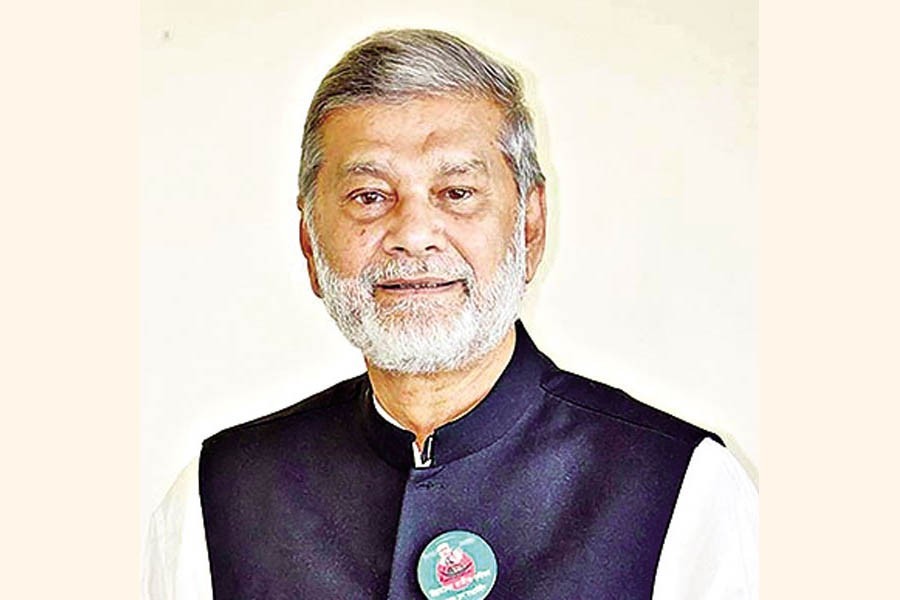
Published :
Updated :

Bangladesh is not treading Sri Lanka's path as the country's socioeconomic fundamentals are on a better base, a government minister said Tuesday to dispel critics' foreboding over economic crisis.
Planning Minister MA Mannan warned such propagators against relating Sri Lanka's economic crisis with Bangladesh's future.
"Some quarters are trying to replicate the current situation in Sri Lanka with Bangladesh, which is not acceptable at all. Our economy and social fundamentals are much stronger than in previous days," he said at a briefing after the Executive Committee of the National Economic Council (ECNEC) meeting.
He said: "We're keeping a close eye on the remarks of some experts and researchers, and we should be careful. I think there isn't any reasonable doubt to think like the situation in Sri Lanka now."
Bangladesh and Sri Lanka are completely two different economies and their fundamentals are also different, Mr Mannan noted.
Replying to another question on the latest crisis in Lanka, the planning minister said that the government neither does any unnecessary work nor undertakes any unnecessary project.
Meanwhile, the ECNEC Tuesday approved a total of 12 projects involving an aggregate cost of Tk 120.17 billion.
Prime Minister Sheikh Hasina presided over the meeting with some cabinet ministers and planning commission officials in attendance.
After the meeting was over, Planning Minister Mannan said out of the Tk 120.17-billion cost, Tk 79.90 billion will come from government's internal resources, Tk 5.94 billion from the project-implementing agencies' own funds and the rest of Tk 34.32 billion as project assistance from the external resources.
Of the approved 12 projects, 10 are new while two are revised ones.
The ECNEC endorsed a Tk 33.98-billion project to ensure infrastructural development in three select city corporations and one municipality alongside enhancing skills of their administrations and improving the living standards of people.
Planning Commission officials said the Local Government Engineering Department (LGED) will implement the Tk 33.98-billion Urban Development and City Governance (UDCG) project by December 2026.
The project will be implemented in Narayanganj, Gazipur and Cumilla City Corporation areas and also in Cox's Bazar Pourashava.
Meanwhile, the Prime Minister at the ECNEC meeting directed the Ministry of Science and Technology to expedite the process of setting up a marine aquarium in Cox's Bazar, said the planning minister.
Member of the General Economics Division (GED) Prof Dr Kawser Ahmed added that the Prime Minister had earlier directed the Ministry of Science and Technology to initiate process of setting up a marine aquarium there.
"A feasibility study has been conducted and project proposal has also been framed. The proposal may come to the Planning Commission soon for getting approval for the marine aquarium project. The aquarium will be an attractive one and people will also learn many things from it," Mr Kawser added.
The planning minister said the Prime Minister also asked the Bangladesh Water Development Board (BWDB) to complete their works in a speedy manner.
When asked about Dhaka Chamber of Commerce and Industry (DCCI) budget recommendation regarding incorporation of fewer projects in the upcoming Annual Development Programme (ADP), Mannan said that since the Awami League government is running the country, it has duties and responsibilities to its people.
"The government takes its own decisions based on the track record, experiences, global market situation and also knowing about the mindset of the development partners," he added.
Answering a question, Planning Commission member Md Mamun-Al-Rashid said that efforts were on especially from the Road Transport and Highways Division to reduce dependency on consultants for implementing projects.
The ECNEC also approved a Tk 22.72-billion project to enhance the power- distribution capacity of Dhaka Electric Supply Company Limited (DESCO) in a bid to ensure sustainable and reliable power supply to its clients.
DESCO will implement the project titled 'Dhaka Power System Expansion and Strengthening Project in DESCO Areas' by December 2025.
The project area covers Hazrat Shahjalal International Airport, Bashundhara, Mirpur Ceramics, Mirpur Swapno Nagar Residential Area, Baridhara and Rupayan City in Uttara, Tongi under Gazipur City Corporation, and Purbachal under Rupganj Upazila of Narayanganj district.
The ECNEC-approved other projects include President Md Abdul Hamid Shilpokola Academy and regional cultural centre, Mithamoin, Kishoreganj, at Tk Tk 695.6 million, Bangladesh Oceanographic Research Institute (2nd phase) at Tk 4.44 billion, Construction and reconstruction of government Shishu Poribar and Chotomoni Nibash hostels (1st revised) at an additional cost of Tk 884.9 million, Irrigation Management Improvement (IMI) for Muhuri Irrigation (3rd revised) at a reduced cost by Tk 174.5 billion, Coastal Embankment Rehabilitation, improvement of drainage system and embankment protection at Tojumuddin and Lalmohon upazilas in Bhola district (1st phase) at Tk 10.96 billion, Irrigation and drainage system development at Purbodhala upazila in Netrakona at Tk 2.06 billion, Riverbank protection work, wave protection and canal re-excavation at 10 upazilas under Kishoreganj district at Tk 6.54 billion, Rural infrastructures development in Jhenidah district at Tk 5.00 billion, Rural infrastructures development in greater Pabna and Bogura districts (2nd phase) at Tk 14 billion, and establishment of Essential Drugs Company Limited, Manikganj Plant, at Tk 19.05 billion.
Meanwhile, Planning Minister Mannan urged the authorities concerned to engage citizens in development project-implementation and-monitoring process to ensure governance and quality.
At a different meeting of Public-Private Stakeholders' Committee in Dhaka, he said it is time to ensure quality implementation of the development projects.
"So, the engagement of the general people in the project-implementation system would bring a good result," the minister told the meet, arranged by Central Procurement Technical Unit (CPTU) of the Planning Commission.
kabirhumayan10@gmail.com


 For all latest news, follow The Financial Express Google News channel.
For all latest news, follow The Financial Express Google News channel.